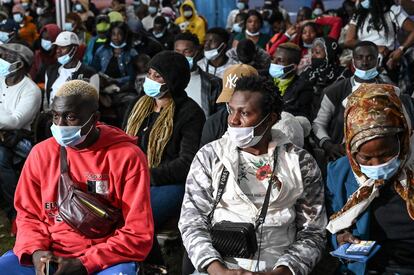Tunisia offers new measures for migrants after racist abuse
The efforts include a hotline for migrants to report any violations of their rights, medical and psychological assistance, and new residence cards for students from other African countries

Tunisia’s government is seeking to allay growing international concerns about a surge of discrimination against sub-Saharan Africans, as the EU warned Monday against hate speech targeting people fleeing conflict and poverty.
African governments have evacuated hundreds of their citizens from Tunisia in recent days after migrants, foreign students and others recounted racist abuse in the streets and online. The tensions erupted after Tunisian President Kais Saied lashed out at migrants last month and inveighed against a perceived plot to erase Tunisia’s identity.
After concerns voiced by Tunisia’s Western and African allies in recent weeks, the Tunisian government announced a string of new, if limited, measures Sunday for sub-Saharan Africans living in Tunisia.
They include a hotline for migrants to report any violations of their rights, medical and psychological assistance for all migrants, and new residence cards for students from other African countries “to facilitate their stay on Tunisian soil.” Another measure waives fines for sub-Saharan Africans who have exceeded their residency permits – if they agree to a voluntary return program.
The situation in Tunisia has worried the EU, which works with Tunisia and other African countries to limit migration to Europe.
European Commission spokesperson Nabila Massrali said Monday: “We’re following very closely the developments and the concerns we have around Tunisia. We expect all of our partners to treat migrants with dignity. We don’t want to hear racist hate speech.”
She urged the Tunisian government to pursue “more inclusive policies” and act to defuse the tensions targeting migrants.
The Tunisian president’s remarks created a climate of fear within African communities in the country. A widely viewed video shared online showed people being chased from their homes, their belongings thrown on the street. A Guinean mother of three described being pelted with rocks as she went to get food for her family. Dark-skinned Tunisians have also been targeted, said activist Saadia Mosbah, who chairs the anti-racist association M’nemti.
On Saturday, two planes carried about 300 people from Mali and Ivory Coast from Tunisia back to their home countries, and about 50 Guineans were evacuated earlier in the week, on planes chartered by their governments, according to Tunisian media. Hundreds of others flocked to their embassies to ask to leave Tunisia.
The crackdown comes as Tunisia is sinking toward economic collapse, with high unemployment and inflation and debts. It also comes as the president has amassed ever-greater powers and moved to stifle opposition voices.
Despite the new government measures for migrants, law enforcement officials continue to round up people without residency papers.
National Guard spokesperson Houssemeddine Jbabli said 58 people of sub-Saharan nationalities were detained Friday in operations to check identity papers in several regions. They were accused of illegally entering Tunisia from Algeria.
Interior Minister Taoufik Charfeddine deemed “unjustified” the accusations that the president’s comments were racist or hateful. “We have only applied the law in force against those who violate it, as is the case in any country,” he said.
According to the Tunisian Forum for Economic and Social Rights, there are some 21,000 sub-Saharan immigrants estimated to be living in Tunisia, many without residency status, and many believed to be heading eventually to Europe. This represents only a tiny fraction of Tunisia’s population of 12 million.
Sign up for our weekly newsletter to get more English-language news coverage from EL PAÍS USA Edition
Tu suscripción se está usando en otro dispositivo
¿Quieres añadir otro usuario a tu suscripción?
Si continúas leyendo en este dispositivo, no se podrá leer en el otro.
FlechaTu suscripción se está usando en otro dispositivo y solo puedes acceder a EL PAÍS desde un dispositivo a la vez.
Si quieres compartir tu cuenta, cambia tu suscripción a la modalidad Premium, así podrás añadir otro usuario. Cada uno accederá con su propia cuenta de email, lo que os permitirá personalizar vuestra experiencia en EL PAÍS.
¿Tienes una suscripción de empresa? Accede aquí para contratar más cuentas.
En el caso de no saber quién está usando tu cuenta, te recomendamos cambiar tu contraseña aquí.
Si decides continuar compartiendo tu cuenta, este mensaje se mostrará en tu dispositivo y en el de la otra persona que está usando tu cuenta de forma indefinida, afectando a tu experiencia de lectura. Puedes consultar aquí los términos y condiciones de la suscripción digital.








































